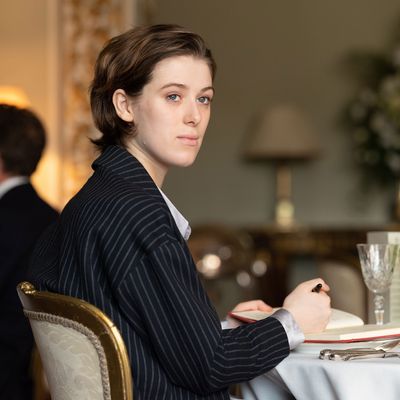
Joanna Hogg prefers to stick the word partly in front of autobiographical in any description of The Souvenir and its new sequel, The Souvenir Part II. She’s not accounting for any wild liberties she might have taken with the record of her days as a London film student in the 1980s but her own recall: “I was only able to tell this story when I realized my memory is not perfect — and that I was going to create an impression of that time rather than a re-creation,” she explained to Rolling Stone when the first film came out in 2019. As hedges go, it’s a funny one — whose memory is then perfect enough to create a true autobiography? — but it speaks to how aware Hogg seems of what she does not, or cannot, know. The scenes in the Souvenirs that aren’t directly experienced by Hogg’s avatar, Julie (the impossibly fresh-faced Honor Swinton Byrne), are sparing and careful, as if following characters out of her line of sight risks overstepping, even in this asterisked version of history. She’s not bound by factual accuracy so much as emotional truth. More than anything, Hogg seems to be seeking a better understanding of the person she was at the time, with the films serving as a mirror that doesn’t reverse her image, offering a fresh angle on a familiar reflection that allows her to notice things she hadn’t before.
This level of self-contemplation would feel indulgent if Hogg weren’t so unsparing with her younger self onscreen — though The Souvenir Part II, with its mirrors-within-mirrors approach, is more in danger of drifting in that direction than its predecessor was. The Souvenir depicts Julie as a formless child of comfortable affluence (Swinton Byrne’s real mother, Tilda Swinton, plays her vague but affectionate parent onscreen as well) whose first truly formative experience comes from her romance with the magnetic, manipulative Anthony (Tom Burke); she doesn’t realize for a long time that he is addicted to heroin, the drug that ultimately kills him. In The Souvenir Part II, Julie abandons her previous thesis project, to the frustration of her professors, in order to make a film based on something she actually knows about: her troubled relationship. The production sequences make up the strongest stretch of the movie, with Julie figuring out what she wants as she goes, enraging her cameraman and occasionally bewildering her cast. In one scene, she even finds herself arguing with the classmate (Ariane Labed) she has recruited to play herself onscreen about the believability of her own past actions.
While this work may not get Julie closer to understanding Anthony, it does help her cement her sense of self. She gains confidence as she enshrines her own recent naïveté and acquiescence onto celluloid. But there’s no denying that the whole affair also ends up feeling circular, a means for these films to defend their own existence as acts of autofiction. The Souvenirs are sometimes brushed off as being simply about rich people’s woes, though they’re much too finely wrought and considered to be dismissed so easily. Not to mention that they’re stealthily funny: Julie’s first post-Anthony dalliance ends with a rambunctious punch line that wraps up a thread about a pregnancy scare, and a deliciously good Richard Ayoade, as Anthony’s acerbic filmmaker friend Patrick, returns to deliver all the best lines while wearing faux fur and having meltdowns over the musical he has been shooting. During a break from filming, he explains to a journalist why he chose that genre by delivering a diatribe about a national tendency toward naturalism (or miserablism). “Look at us,” he says. “We’re in the pissing rain. Wouldn’t you want to be on a soundstage in widescreen rather than here, like every other fucking English film ever made, where it’s drizzling?”
Patrick might as well be describing the project Julie initially intended to direct, a coming-of-age story set in the industrial city of Sunderland that’s exactly the sort of po-faced material a well-off student from London would decide is meaningful while having no experience with it. In changing her focus, Julie is hewing to the hoary adage of writing what you know, while accepting that she’s young and untested enough not to know very much at all beyond the painful relationship she has just emerged from. There’s a sealed-off quality to The Souvenir Part II that the first installment doesn’t have, a sense of surrendering to the idea that it’s possible to authentically portray only oneself — which may be true and may be a creative dead end. But even that turns out to be by design, something both the film and its protagonist can acknowledge and then escape with a fantasy sequence that sends Julie out of her first screening and into an abstract set of scenes evoking her memories, her process, and her inner turmoil. If this detour into spectacle doesn’t entirely achieve the transportive highs it tries for, its point is still taken, especially when Julie goes off to shoot music videos with the assurance of an artist coming into her own. It may not be a musical in widescreen, but it embodies the kind of liberty of vision that even Patrick might grudgingly approve of.
More Movie Reviews
- Anyone But You Has More Sex on Its Mind Than Your Average Rom-Com
- An Exploited Neighborhood, Seen Through Children’s Eyes
- Challengers Is Almost a Sexy Movie





